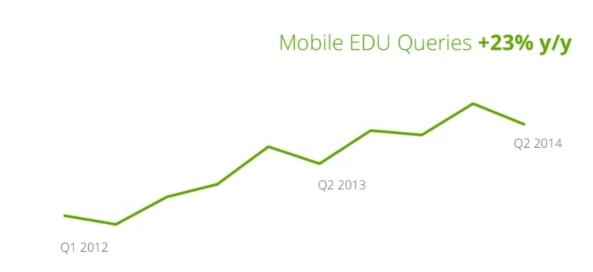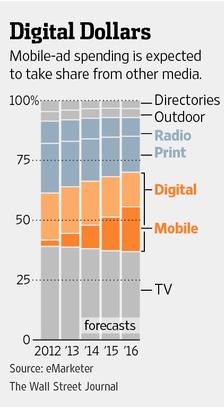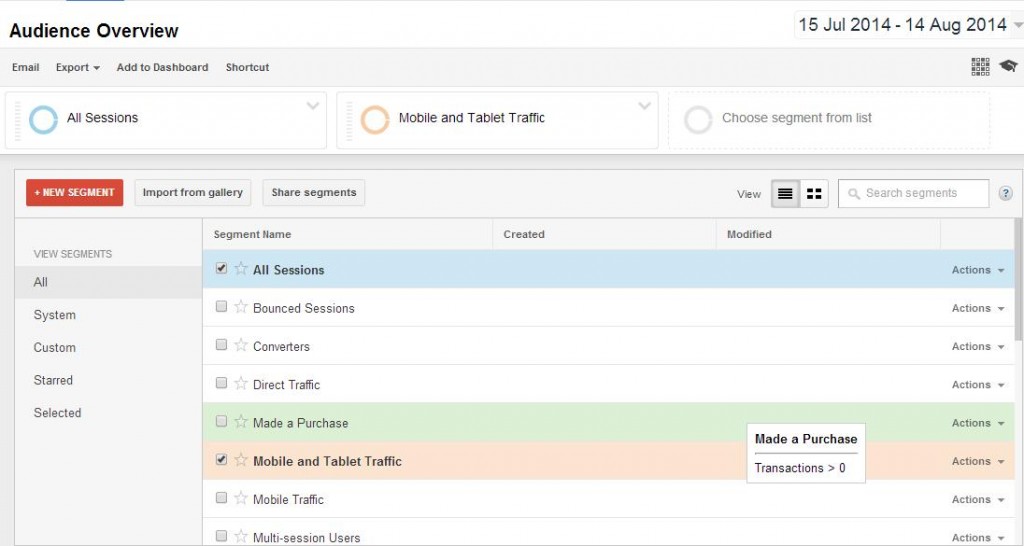It is pretty common for higher ed institutions to use desktop-based PPC to market specific programs, events or even for general branding campaigns. Less common are schools who have made the move to incorporate mobile PPC. Mobile PPC is an emerging and rapidly evolving marketplace, which presents new challenges to university and college marketing managers, with lots of unknowns and risk. So how do you determine when or if your institution is ready to move into this channel?
Here are three questions to help you determine if mobile PPC is a good option for you.
1) Where is higher ed desktop vs mobile search headed?

Source: Google 2014 Q2 Education Search Analysis
In Google’s recent Education Search Analysis for Q2 2014, it was reported that for the first time since 2012, the total higher education search market has shrunk by 1%. Conversely, mobile-based education queries have increased by 23%, year over year. Google don’t provide the details so we don’t know the actual numbers that those percentages represent, but the message is pretty clear. Search on higher education terms is declining on desktop and increasing on mobile (smartphone and tablet) devices. So, if you want to reach a growing percentage of your future students, where they are searching, it seems pretty clear that you need to consider mobile PPC.
Here’s another take on the growth of mobile marketing from the digital gurus at eMarketer and the Wall Street Journal on overall advertising spend across all industries. It’s expected that mobile advertising will continue its dramatic growth in the next few years, taking share of advertising dollars from traditional channels. My guess is that higher ed will follow suit.

Source: eMarketer/Wall Street Journal
2) What percentage of your web traffic is mobile today?
So, the general marketplace is clearly moving towards mobile, but what about your specific target audience, in your specific geographic region? The best indicator for this is to turn to your website’s Google Analytics account and determine what percentage of your current traffic comes from mobile devices. In this real example of a college below, 34 % of the school’s traffic is currently coming from mobile devices. This example is already quite high, and would appear to be a sign of things to come.
To produce this report in Google Analytics, all I did was go to Audience Overview, click on Add a segment, check on Mobile and Tablet and Apply (as seen below.)
 So the prospective student market in general appears to be moving in this direction and likely you have determined that a growing percentage of your institution’s existing traffic is mobile, so the answer seems pretty obvious right? Well, don’t jump the gun yet. There is one more very important, question.
So the prospective student market in general appears to be moving in this direction and likely you have determined that a growing percentage of your institution’s existing traffic is mobile, so the answer seems pretty obvious right? Well, don’t jump the gun yet. There is one more very important, question.
3) What’s your website’s mobile experience like?
If you have a responsive site or specific mobile versions of your website, then you are in pretty good shape to move into mobile PPC. If you don’t, I’d recommend against it. I would put your resources into creating a high quality mobile experience for your mobile visitor and once that’s in place, then make the move into mobile advertising.
Mobile ads need mobile landing pages, which need to push to mobile sites to be truly effective. I am sure you’ve all had the rather dreadful experience of searching for something on your smartphone, finding an appropriate ad, clicking on it and then ending up on a page designed for desktop, that you can’t read and can barely interact with.
Some digital marketing managers who have worked with mobile PPC will point out that they have had poorer conversions rates with mobile and that they feel that lead quality is lower. Personally, I am on the fence on this one because I have seen some really bad results and some really great results with mobile PPC. But regardless, at this point, with the search market moving so quickly towards mobile, I believe we have no choice but to proceed and simply have to figure out what makes for the best mobile experience, adopt it and then optimize for lead and registrations conversions.
What has your experience been with mobile PPC. What have your results been with conversion rates and lead quality? Would you recommend to your higher ed colleagues to invest in mobile PPC.






